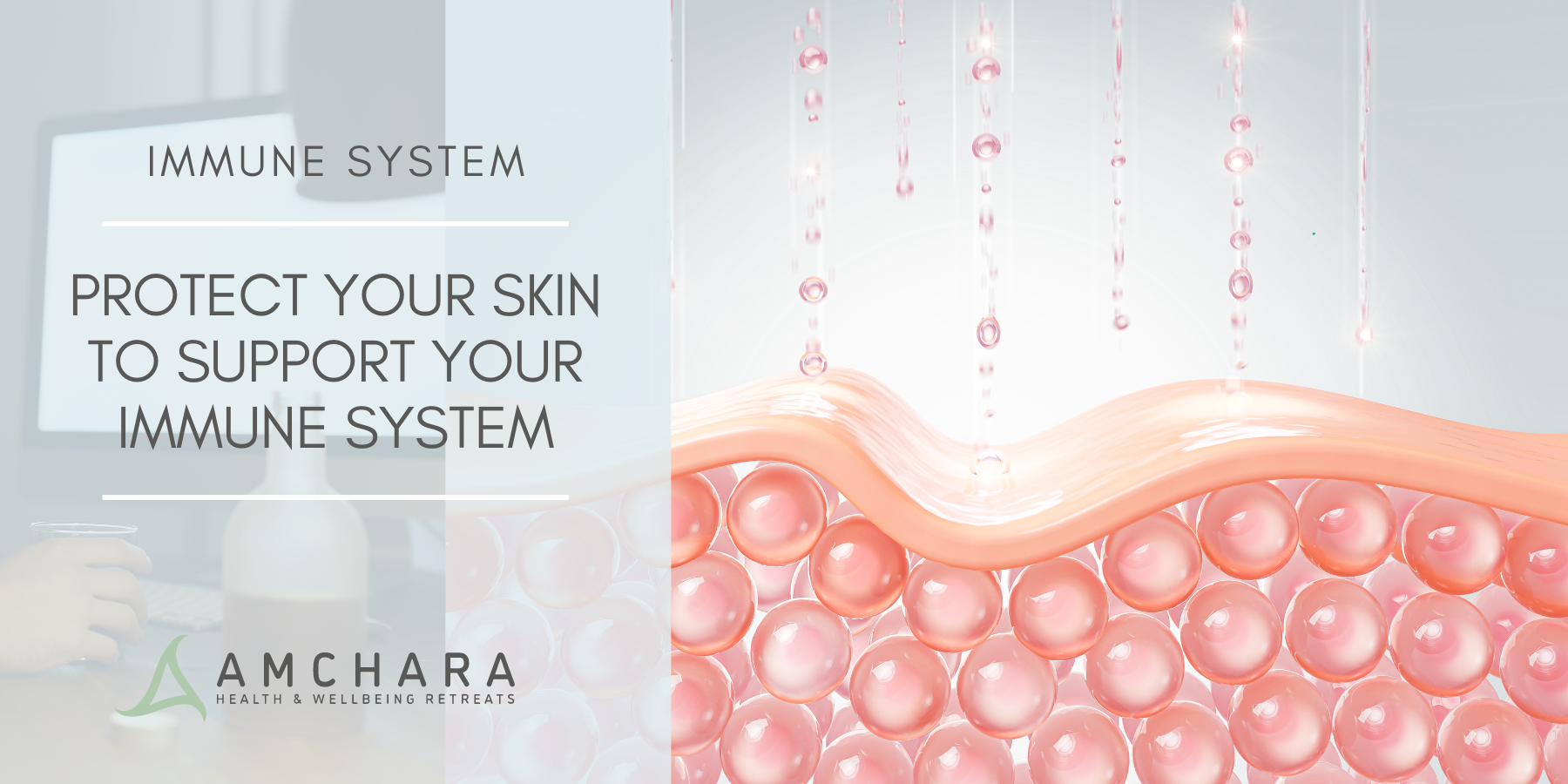The skin is your body’s largest organ, making up about a seventh of your body weight, and the first line of defence, providing a protective barrier against harmful microbes. Your skin plays a critical role in your overall health, including immune function. When skin health is compromised, the immune system can be significantly impacted.
Our articles are always evidence-based and oriented to a Personalised Health approach, and we aim to provide you with actionable knowledge and tips to help you on your journey to optimal health.
In this article, we’ll explore how your skin protects you, how environmental and lifestyle factors can undermine the health of your skin, and we’ll give you some strategies to optimise your skin’s wellbeing, and support your immune system.
The skin: your body’s largest organ and immune defender
Your skin acts as a waterproof barrier that prevents microorganisms from entering the body, unless the skin is broken. As an essential part of the body’s immune system, your skin helps fend off pathogens, environmental pollutants, and harmful microorganisms such as bacteria, viruses, toxins, parasites, and funghi, and other toxic substances.
The skin consists of three primary layers: the epidermis, dermis, and subcutaneous tissue. Each layer plays a distinct role in maintaining your overall health. The outermost layer – the epidermis – acts as a physical barrier against bacteria, viruses, toxins, and environmental pollutants. It also contains immune cells, such as Langerhans cells, that detect harmful invaders and initiate an immune response.
The health of the skin impacts the immune system because when the skin barrier is weakened or damaged, harmful substances can penetrate the body, leading to infections or inflammation. Immune cells in your skin are vital to help prevent and recover from infection, as well as for reconstructing and restoring optimal tissue.
Compromised skin function can lead to chronic skin conditions like eczema, psoriasis, or infections that can burden the immune system, diverting vital resources that the body could otherwise use for other immune functions.
The impact of environmental pollutants on skin health
Modern day environmental pollutants have a profound impact on the skin. From air pollution to chemical exposure, these pollutants accelerate skin ageing, weaken its natural defences, and impair its function. Fine particulate matter in the air, commonly found in urban environments, can penetrate deep into the skin and trigger oxidative stress, leading to inflammation, dehydration, and the breakdown of collagen.
Ozone exposure, for example, depletes antioxidants like Vitamin E in the skin, further weakening its resilience against environmental damage. In the long term, this oxidative stress can contribute to the development of chronic skin diseases, pigmentation disorders, as well as increased susceptibility to infections.
Smoking, alcohol, and processed foods
Lifestyle choices, such as smoking, excessive alcohol consumption, and a diet high in processed foods, can wreak havoc on your skin and, consequently, your immune system.
How the skin and immune system are connected
Your skin and immune system are intricately connected. The skin acts as a physical barrier, but it also contains a network of immune cells that act as sentinels, detecting and responding to threats. When your skin’s health is compromised due to factors like pollution, poor diet, or lifestyle habits, these immune cells become less effective, making the body vulnerable to pathogens.
For example, skin conditions like eczema or dermatitis are often linked to immune dysfunction. When your skin’s barrier is weakened, allergens and irritants can penetrate more easily, triggering an immune response that leads to inflammation and exacerbates the condition. Similarly, when your immune system is weakened due to poor skin health, your body becomes more susceptible to infections such as fungal or bacterial skin infections.
Strategies to optimise your skin’s health
Improving your skin health is essential for supporting your immune system and overall wellbeing. Taking an holistic, personalised approach to caring for your skin can help restore and maintain your skin’s natural barrier function and optimise its vital role in immune defence.
Here are our top 7 strategies to optimise your skin’s health:
Takeaway
Your skin plays a critical role in protecting you from environmental stressors and supporting your immune system. However, environmental pollutants, unhealthy lifestyle choices, and poor dietary habits can weaken the skin’s natural barrier, leading to immune dysfunction and a higher risk of infections and chronic skin conditions.
By adopting an holistic, personalised approach to skin care, focusing on a nutrient-rich diet, hydration, avoiding harmful toxins, and managing stress and restorative sleep, you can optimise your skin’s health and enhance its ability to protect you. Remember, your skin is a vital organ that impacts your overall health and immunity.
If you are looking for support to optimise your health, come to one of our beautiful detox health retreats, designed to help you detoxify both physically and mentally – either in the tranquil English countryside or on the beautiful Mediterranean island of Gozo.
We passionately provide personalised detox and wellness programmes for lasting health improvements. Our expert team, including naturopaths and nutritionists, lead diverse programmes for weight management, gut health, stress relief, and more.
Our Personalised Health practitioners will support you through your detox journey, recommending positive, sustainable lifestyle choices tailored to your individual health circumstances and goals.
At Amchara, you will be immersed in a supportive and nurturing environment, combining a Functional Medicine and naturopathy approach, that enables you to switch off, relax and kickstart your health journey, and Change for Good.




